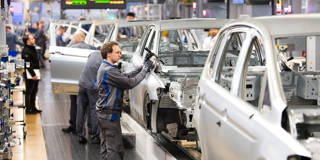The electric-vehicle revolution that propelled Chinese carmakers to global prominence is now threatening to render the German automobile sector obsolete. Unless policymakers act fast, Germany could soon face a painful deindustrialization process similar to what the United States experienced in the early 2000s.
MUNICH – The German and American automobile executives attending this year’s Shanghai motor show may have expected to take a victory lap following their three-year pandemic-related absence. Instead, Western manufacturers were met with a harsh reality: dozens of new Chinese-made electric vehicles are coming for their market share.
Over the past few years, the rise of EVs has propelled the Chinese auto industry to global prominence. China’s auto exports already overtook Germany’s in 2022, following a 54% increase, and the country is projected to surpass Japan to become the world’s largest car exporter this year.
The shift was evident in Shanghai, where Chinese consumers ignored the offerings from BMW, Volkswagen, and Mercedes in favor of new models from Chinese manufacturers BYD and Nio. Compared to the new Chinese cars, with their cutting-edge batteries and sensors, the German-made EVs seemed almost outmoded. For decades, German engineers perfected the internal combustion engine; now, the EV revolution is threatening to render all their technological know-how obsolete.

MUNICH – The German and American automobile executives attending this year’s Shanghai motor show may have expected to take a victory lap following their three-year pandemic-related absence. Instead, Western manufacturers were met with a harsh reality: dozens of new Chinese-made electric vehicles are coming for their market share.
Over the past few years, the rise of EVs has propelled the Chinese auto industry to global prominence. China’s auto exports already overtook Germany’s in 2022, following a 54% increase, and the country is projected to surpass Japan to become the world’s largest car exporter this year.
The shift was evident in Shanghai, where Chinese consumers ignored the offerings from BMW, Volkswagen, and Mercedes in favor of new models from Chinese manufacturers BYD and Nio. Compared to the new Chinese cars, with their cutting-edge batteries and sensors, the German-made EVs seemed almost outmoded. For decades, German engineers perfected the internal combustion engine; now, the EV revolution is threatening to render all their technological know-how obsolete.